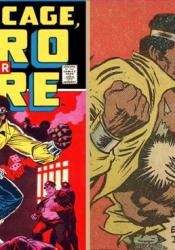Luke Cage
At this point in comics history, publishers were looking to other forms of media for inspiration, clearly taking inspiration from the Blaxploitation films of the era to emulate into comic book characters. Both of the two big comic publishers, DC and Marvel, tried and failed to create long-lasting black superheros. Brown claims the reason for this is that their black characters were too closely identified with the limited stereotype commonly found in the blaxploitation films of the era.
In the introduction of Frances Gatewar and John Jennings' book The Blacker the Ink: Constructions of Black Identity in Comics and Sequential Art, they claim that comics traffic in stereotypes and fixity, often portraying black superheros in a positive light due to their physicality and nothing else. They claim that black characters have inherent issues built into the very conventions of the genre due to the fact that the Black Body has historically been linked to physicality and not intelligence. 20 years from now, Milestone Comics will set out to reverse this sterotype, creating characters that are centered around their compassion and intelligence rather than their physicality.
Brown, Jeffrey A. Black Superheroes, Milestone Comics, and Their Fans Milestone Comics and Their Fans. University Press of Mississippi, 2000.
Gateward, Frances K., and John Jennings. The Blacker the Ink: Constructions of Black Identity in Comics and Sequential Art. Rutgers University Press, 2015.

